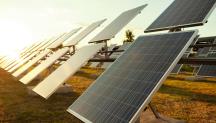IRENA project 52% growth for Nigerian renewable energy in 7 years
January 23, 2023787 views0 comments
By Innocent Obasi
Nigeria’s renewable energy is expected to record a 52 per cent growth in the share of primary energy requirements between 2023 and 2030, driven by an increased renewable uptake, according to analysts at the International Renewable Energy Agency (IRENA).
The energy agency, in a report titled “Renewable Energy Roadmap for Nigeria,” developed in collaboration with the Energy Commission of Nigeria, said that electrification plays a significant role in achieving this renewable energy share with the share of electricity in final energy use nearly doubling by 2050.
“The share of primary energy requirements met with renewable energy reaches 47 per cent by 2030 and 57 per cent by 2050. In terms of final energy consumption this corresponds to a renewable share of 52 per cent by 2030 and 59 per cent by 2050,” IRENA said.
Read Also:
- Nigerian business leaders bet on economic growth amid inflation woes
- Obasanjo hailed as visionary behind $800m Aba power project
- Energy challenges and impact on the economy
- Seplat Energy said committed to leading Nigeria’s indigenous gas revolution
- Strategic management as key to business and national growth
The report noted that cooking is currently the most energy-intensive activity in the buildings sector, but as the use of inefficient traditional biomass stops and households transition to efficient cookstoves by 2030 and beyond, the share of the residential sector in total final energy drops substantially.
It clarified the relationship between the traditional biomass and renewable energy, saying that should traditional biomass be considered as renewable energy, then modern energy access has the capacity to reduce the share of renewables in household fuel mix. However, it said this must be carefully considered in terms of efficiency of the stoves and effects of air pollution.
The report recommended the need to diversify the cooking mix with electricity and modern renewables that are convenient for cooking in a way that is comparable to or even better than liquefied petroleum gas (LPG), saying that it will promote renewable energy in the Nigerian residential sector.
Assessing the impact of expanding existing appliance and lighting programmes on an increased renewable uptake, the energy agency said that the share of efficient lighting, refrigerators and air conditioners would rise in both rural and urban households by up to 50 per cent by 2030 and to 100 per cent by 2050.
This scenario in 2050, it said, will see an increase in household income level which need not increase energy demand. It added that the ambitious scenario demonstrated how a shift towards the adoption of energy-efficient technologies can reduce the overall energy requirement of the sector.
On the acceleration of electricity capacity additions in the country’s power sector through the use of distributed solar photovoltaic (PV), it said that a total installed power generation capacity needed in an increased renewable uptake will reach 62 gigawatts (GW) in 2030 and 178 GW in 2050, of which 77 per cent will be renewable in 2030 and 92 per cent will be renewable in 2050.
It noted that solar PV capacity is a “no-regrets” investment in this scenario, reaching 32 GW in 2030 and 115 GW by 2050 in an increased renewable uptake. It also explained that in terms of electricity generation shares, this corresponds to 70 per cent by 2030 and 84 per cent by 2050.
“Blended finance and microfinance will help deliver this, especially in the substitution of diesel generators by solar home kits and mini-grids, which have a higher upfront cost but significantly lower operation cost,” the report stated.
This, it said, will combine favourably with increased electrification of various end uses, further driving down the energy intensity of demand sectors with some of the lowest-cost power available on the market today.
Assessing the impact of a faster adoption of biofuels and electric vehicles on an increased renewable uptake, it said that these when combined with an increased role for public transportation will help to sustainably meet growing transportation demand.
“Achieving universal energy access by 2030 has the potential to alter the final energy demand composition of Nigeria,”it added.
The energy agency also noted that Increased and sustained investment in renewables is capable of assuring nearly 60 per cent of Nigeria’s energy demand in 2050, saving 40 per cent in natural gas and 65 per cent in oil needs at the same time.
According to IRENA, Nigeria is faced with challenges of gratifying the needs of a fast growing population and a range of socio economic issues.
To address the worrisome issue, the report states that the country requires sustainable energy sources to meet the growing needs for all the sectors of its economy and achieve universal access to modern energy services.
To this effect, the report emphasised that the application of renewable energy technologies in the maximisation of its untapped renewables, is a key to achieving a sustainable energy mix, delivering economic growth and jobs, while achieving global climate and sustainable development objectives.
Francesco La Camera,IRENA’s director-general remarked that by using its abundant renewables,Nigeria can provide sustainable energy for all its citizens in a cost-effective manner.
“Nigeria has a unique opportunity to develop a sustainable energy system based on renewables that support socioeconomic recovery and development, while addressing climate challenges and accomplishing energy security,” he added.
Adeleke Olorunimbe Mamora, Nigeria’s minister of science, technology and innovation added: “The highly distributed institutional structure of the energy sector in Nigeria means that coordination of policies will be essential to unlocking integrated energy transition planning and ensuring its success.
According to Mamora, a cross cutting agency or body tasked with doing so would be helpful in building consensus and developing a coherent plan which in turn would allow for the scaling up of renewable energy to meet the needs across the Nigerian energy sector.

